'Amir Alzzalam
Šayṭānist
- Messages
- 1,158
- Reaction score
- 351
- Points
- 83
Who refers to himself in the third person?Why would he refer to himself in the third person?
Nietzsche’s comment in On the Genealogy of Morals was probably inspired by Goethe’s Faust, in which Faust counters the Gospel of John’s “In the beginning was the Word” with “In the beginning was the Deed!” (scene 3, Faust’s Study).
There are several things going on. In the first place, Nietzsche is denying the independence of will and action. In the moral tradition that Nietzsche opposes, action is understood to be caused by the will, and the will is understood to be a faculty of the self, mind, or soul. It is an “inner” entity that causes outer, external, physical actions to take place. The will is what Nietzsche has in mind when he speaks of the “doer.” The moral significance of the doer is that, as the cause of action, it is fit to be held morally responsible for the actions it causes – assuming that the doer might always have done otherwise, i.e. assuming free will.

